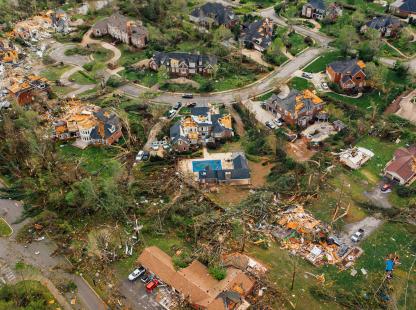
Environmental Health and Hurricane Impacts
Research in Puerto Rico
Akram N. Alshawabkeh, Ph.D.
Senior Associate Dean for Research and Graduate Education, Northeastern University
November 1, 2019, 11:30 am - 1:00 pm
Campus Center Atrium, NJIT Main Campus
There are over 200 hazardous waste sites in Puerto Rico, including 24 Superfund sites, causing significant contamination of water resources. Air pollution from refineries, power plants, motor vehicles, and large ships at ports is also very high. Puerto Ricans stand out as the most health-disparate Hispanic subgroup; Puerto Rico has one of the highest preterm birth rates among all U.S. states and territories. The population is, on average, significantly poorer than the general U.S. population. Moreover, in September 2017 the island was struck by Hurricane Maria, the most powerful hurricane to hit the island in 80 years.
Since 2010, the PROTECT Center has brought together researchers from Northeastern University, the University of Puerto Rico, University of Georgia, and the University of Michigan to provide much-needed understanding of the relationship and the mechanisms by which exposure to suspect chemicals in Puerto Rico contribute to preterm birth, and to develop new methods to reduce risk of exposure. PROTECT integrates epidemiological, toxicological, fate and transport, and remediation studies, with a unified sampling infrastructure, a centralized indexed data repository, and a sophisticated data management system.
Since the Center’s inception, PROTECT researchers have obtained novel results indicating (1) extensive groundwater contamination in the study area in Puerto Rico; (2) potential mechanisms by which chemicals may stimulate preterm birth; and (3) suspect chemicals are elevated in Puerto Rican women. This presentation provided an overview of PROTECT’s research, and a summary of Hurricane Maria’s impacts on research activities and relationship with the impacted community.
Speaker Akram N. Alshawabkeh is the George A. Snell Professor of Engineering and Senior Associate Dean for Research and Graduate Education for the College of Engineering at Northeastern University. He is a civil and environmental engineer with expertise in environmental restoration and health, contaminant fate and transport, and geochemistry. He is the Principal Investigator of two federally-funded centers: the Puerto Rico Test Site for Exploring Contamination Threats (PROTECT), an NIH Center; and the Center for Research on Early Childhood Exposure and Development in Puerto Rico (CRECE), a joint NIH/EPA Center. Dr. Alshawabkeh is a Fulbright Scholar, a Fellow of the ASCE, a recipient of the NSF CAREER Award, and a recipient of the ASCE Thomas A. Middlebrooks Award. He received his Ph.D. in 1994 from Louisiana State University, and his B.S. in 1988 and M.S. in 1990 from Yarmouk University in Jordan.
NJIT welcomed attendees from all area colleges, universities, and professions. This public forum qualified attendees for Professional Development Hours.
Sponsors:
Albert Dorman Honors College
John A. Reif, Jr. Department of Civil and Environmental Engineering,
Otto H. York Dept of Chem and Material Engineering,
Dept of Chemistry and Env Science, Sigma Xi NJIT Chapter, and NJIT ASCE Chapter.